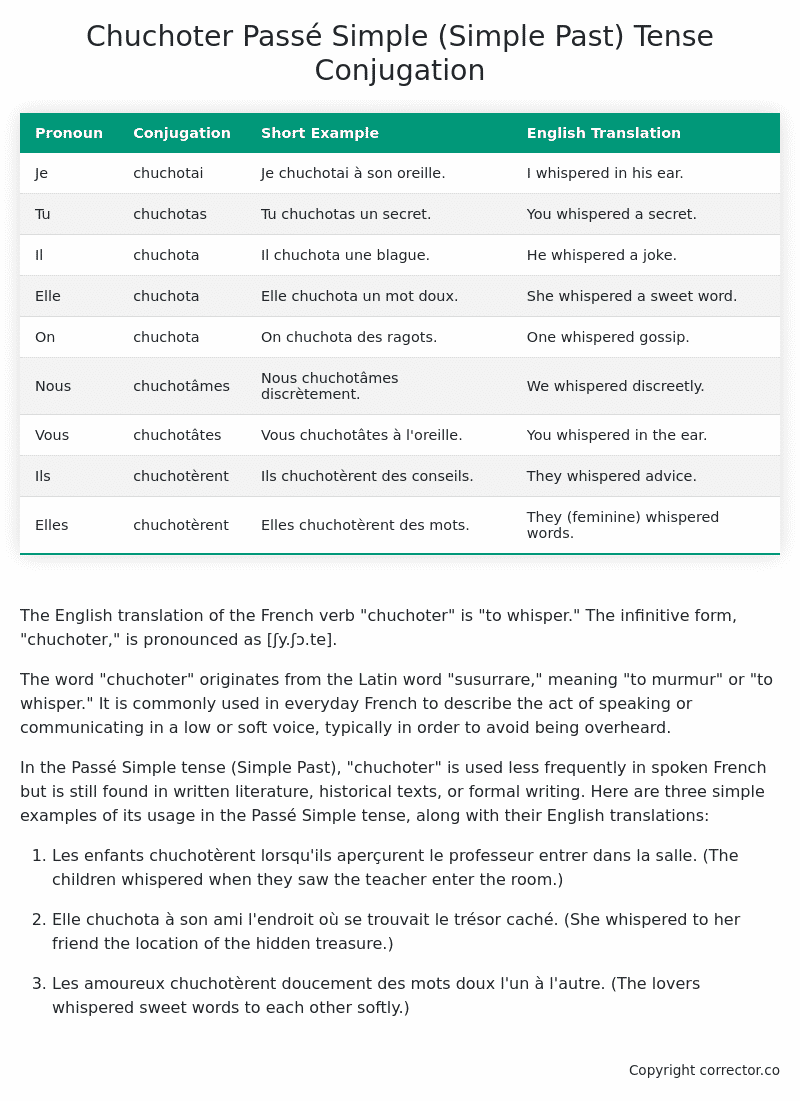Passé Simple (Simple Past) Tense Conjugation of the French Verb chuchoter
Introduction to the verb chuchoter
The English translation of the French verb “chuchoter” is “to whisper.” The infinitive form, “chuchoter,” is pronounced as [ʃy.ʃɔ.te].
The word “chuchoter” originates from the Latin word “susurrare,” meaning “to murmur” or “to whisper.” It is commonly used in everyday French to describe the act of speaking or communicating in a low or soft voice, typically in order to avoid being overheard.
In the Passé Simple tense (Simple Past), “chuchoter” is used less frequently in spoken French but is still found in written literature, historical texts, or formal writing. Here are three simple examples of its usage in the Passé Simple tense, along with their English translations:
-
Les enfants chuchotèrent lorsqu’ils aperçurent le professeur entrer dans la salle.
(The children whispered when they saw the teacher enter the room.) -
Elle chuchota à son ami l’endroit où se trouvait le trésor caché.
(She whispered to her friend the location of the hidden treasure.) -
Les amoureux chuchotèrent doucement des mots doux l’un à l’autre.
(The lovers whispered sweet words to each other softly.)
Table of the Passé Simple (Simple Past) Tense Conjugation of chuchoter
| Pronoun | Conjugation | Short Example | English Translation |
|---|---|---|---|
| Je | chuchotai | Je chuchotai à son oreille. | I whispered in his ear. |
| Tu | chuchotas | Tu chuchotas un secret. | You whispered a secret. |
| Il | chuchota | Il chuchota une blague. | He whispered a joke. |
| Elle | chuchota | Elle chuchota un mot doux. | She whispered a sweet word. |
| On | chuchota | On chuchota des ragots. | One whispered gossip. |
| Nous | chuchotâmes | Nous chuchotâmes discrètement. | We whispered discreetly. |
| Vous | chuchotâtes | Vous chuchotâtes à l’oreille. | You whispered in the ear. |
| Ils | chuchotèrent | Ils chuchotèrent des conseils. | They whispered advice. |
| Elles | chuchotèrent | Elles chuchotèrent des mots. | They (feminine) whispered words. |
Other Conjugations for Chuchoter.
Le Present (Present Tense) Conjugation of the French Verb chuchoter
Imparfait (Imperfect) Tense Conjugation of the French Verb chuchoter
Passé Simple (Simple Past) Tense Conjugation of the French Verb chuchoter (You’re reading it right now!)
Passé Composé (Present Perfect) Tense Conjugation of the French Verb chuchoter
Futur Simple (Simple Future) Tense Conjugation of the French Verb chuchoter
Futur Proche (Near Future) Tense Conjugation of the French Verb chuchoter
Plus-que-parfait (Pluperfect) Tense Conjugation of the French Verb chuchoter
Passé Antérieur (Past Anterior) Tense Conjugation of the French Verb chuchoter
Futur Antérieur (Future Anterior) Tense Conjugation of the French Verb chuchoter
Subjonctif Présent (Subjunctive Present) Tense Conjugation of the French Verb chuchoter
Subjonctif Passé (Subjunctive Past) Tense Conjugation of the French Verb chuchoter
Subjonctif Imparfait (Subjunctive Imperfect) Tense Conjugation of the French Verb chuchoter
Subjonctif Plus-que-parfait (Subjunctive Pluperfect) Tense Conjugation of the French Verb chuchoter
Conditionnel Présent (Conditional Present) Tense Conjugation of the French Verb chuchoter
Conditionnel Passé (Conditional Past) Tense Conjugation of the French Verb chuchoter
Conditionnel Passé II (Conditional Past II) Tense Conjugation of the French Verb chuchoter
L’impératif Présent (Imperative Present) Tense Conjugation of the French Verb chuchoter
L’impératif Passé (Imperative Past) Tense Conjugation of the French Verb chuchoter
L’infinitif Présent (Infinitive Present) Tense Conjugation of the French Verb chuchoter
L’infinitif Passé (Infinitive Past) Tense Conjugation of the French Verb chuchoter
Le Participe Présent (Present Participle) Tense Conjugation of the French Verb chuchoter
Le Participe Passé (Past Participle) Tense Conjugation of the French Verb chuchoter
Struggling with French verbs or the language in general? Why not use our free French Grammar Checker – no registration required!
Get a FREE Download Study Sheet of this Conjugation 🔥
Simply right click the image below, click “save image” and get your free reference for the chuchoter Passé Simple tense conjugation!

Chuchoter – About the French Passé Simple (Simple Past) Tense
Formation
Usage
Narration
Historical Context
Interactions with other tenses
Passé Composé
Imparfait
Conditional and Subjunctive
Summary
I hope you enjoyed this article on the verb chuchoter. Still in a learning mood? Check out another TOTALLY random French verb conjugation!


